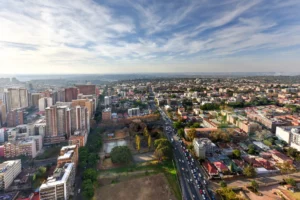The Resurgence of Township Authority

People who have never been to a township will gain a new and more informed perspective on the enormous role townships play in South African society as a consequence of Vanya Gastrow’s dissection of a sub-strata of systems that operate in parallel to local laws. Those who have visited townships will also gain a new and more informed perspective.
Some people have forgotten, and others aren’t old enough to know, but Steve Biko had doubts about the possibility of black people becoming fully integrated into society. He thought that black South Africans could not extricate themselves from their current situation by attempting to integrate into white society. Biko was steadfast that there would not be true unity between blacks and whites until both groups were able to freely discuss issues relating to race.
His statement implies a level of emotional awareness that goes beyond pointing the finger, and it was particularly pertinent during the process of dismantling apartheid. But where does such audacious and forward-thinking reasoning stand in the modern world? Do people in South Africa have enough sophistication and breadth of experience to want to question the foundations of their belief systems? Or have decades of mistreatment at the hands of authorities that have ceased to provide for their people, let alone bring them together, leaving us worn out and enraged? These are tough questions.
Not only does Citizen and Pariah remove the veil of secrecy that has been placed over xenophobia – which is woven into the very fabric of township existence and is hardwired in the subconscious of every resident of the townships – but it also guides and reveals the truth, leading to a reevaluation of why and how crime is committed in the townships. One can gain a profound understanding of how residents live their lives, how they respond to criminal behavior, and how they come to form certain attitudes within their societies. You will come to an understanding of the reasons why the police and the government frequently ignore what is going on in townships.
Completely Fictitious Legislation

According to Vanya’s report, a Reverend Mbekwa, who for many years has presided over discussions between traders in Khayelitsha, spoke to an audience at the Khayelitsha Resource Centre about traders from other countries who do business in Cape Town. “What he characterizes as official ‘legislation’ is partly fictional…,” she writes. In Cape Town, no law mandates permit requirements for spaza shops. Similarly, no ordinance restricts what is known as the “influx” of foreign merchants into the neighborhood or the city. However, it appears that no one in the room, including the delegates of the South African Police Service who are present, can question Mbekwa’s fabrication of a concurrent legal reality.
As a person who lives in the city of South Africa, one of the most significant errors you can make is to believe that the society found in the townships is disordered and chaotic.
Vanya’s statement that the townships on the outskirts of Cape Town depend on self-help and leadership is completely comprehensible. The neighborhoods are very well organized, starting at the street level and working their way up. There are street committees that meet on a regular basis, sometimes twice a week. Unresolved concerns are first addressed by area committees, and if those efforts are unsuccessful, the matter is brought before ward or township committee meetings. The South African National Civic Organization (SANCO), which is invested in township governance, is responsible for all of these things.
This strictly regulated system includes regulations and penalties that are completely made up, and they operate in an alternate reality to the actual laws that are in place in the local area. There is no comparison between the two worlds. Vanya explains that the fabricated system often wins out over the many voices of those on the ground level because they are unable to contend with the power structure.
She explains that the inhabitants of the community are the ones who are responsible for enforcing their laws and that this means that the punishments for breaking the laws and traditions can be extremely violent. The government and the police are hesitant to participate, preferring to remain neutral to prevent an “upsurge” in the situation and outbreaks of violence. As a result, they are not doing much to correct the residents’ misunderstanding of the law. Foreign merchants are the ones who suffer the most as a result of these informal systems.
According to Vanya writes, “Somalis have formed neighborhood enclaves in most cities across the country where they live in close-knit communities that are primarily separated from prominent South African society.” According to her, locals in SA are willing to tolerate them due to the variety of services they provide and the low prices at which they are offered. The vast majority of Somali refugees are permitted to legally reside and work in South Africa. However, as a result of South Africa’s erratic and untrustworthy refugee reception offices, their rights are in jeopardy.
Social Equality in the Communities

One female During her interviews, Vanya explains the punishment that is handed out, bringing to mind a troublesome young person in Lloyd who violated the law after the crime. After the juvenile offender was taken into custody, the committee held a meeting to deliberate on his future. The attendees at the meeting were upset and at the end of their tether, and after a brief discussion, the leaders of the community asked for all of the women to leave the location.
She claims that at the time she thought the request was strange, but that she complied with the commands and left anyway. It appears that the men who stayed behind surrounded the troubled young man and beat him to death. Vanya writes, “I find it challenging to completely digest this dramatic depiction, and as I drive home, I am in a state of numbed horror.”
After speaking with the proprietor of the store, she writes in her report that “Just working at a spaza shop can be a type of emotional warfare.” One of the former merchants of Khayelitsha admitted, “I couldn’t rest at night.” Within a short distance of him, three of his friends were brutally murdered in separate incidents. During the night, while he was tossing and turning in bed, his mind would race with images of potential attackers waiting in ambush.
According to Vanya, “to a large extent, violent revenge was a method of acquiring a sense of authority over local communities as much as it was a way of seeking justice.”
“The use of violence against perpetrators, suspects, or “skollies” appeared to be a purging, an ongoing effort to remove what was seen as improper or corrupt within our societal structure through the use of violent means. Residents were able to establish a revived sense of security and control through the use of such behaviors, which in turn allowed them to release long-suppressed emotions of individual and social frustration and unhappiness.




